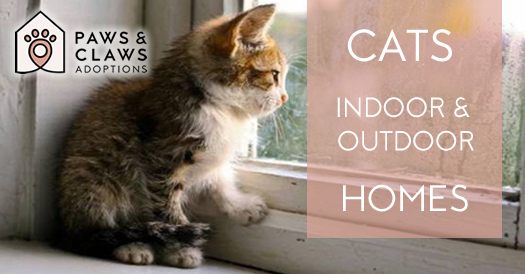Cats – Indoor and Outdoor Homes
 Paws & Claws Adoptions aims to rehome our cats into stable families that are able to provide them with a lifelong loving home.
Paws & Claws Adoptions aims to rehome our cats into stable families that are able to provide them with a lifelong loving home.
The homes that our cats go into can be ones where the cat is kept indoors all the time or ones where they can freely go indoors and outdoors.
We refer to cats that are kept indoors all the time as ‘Indoor only’ cats. However we also class cats that go outside on a lead, outside via a cat run or outside in a purpose built cat enclosed yard as ‘Indoors only’.
Paws & Claws Adoptions always recommends that cats are kept as ‘Indoor only’ pets. Keeping your cat indoors has the following benefits:
- They tend to live healthier longer lives.
Studies have consistently shown that urban cats that go outdoors have far shorter life spans (averaging 2 years or less), while most indoor cats will live over 15 years. - There is no risk of them being injured or killed by cars.
- Reduced risk of poisoning from pesticides, fertilizers, plants and flowers.
Pesticides like snail bait and rat poison are dangerous because they are sweetened or scented to attract pests and cats can often be an unintended victim.
Some common plants and flowers in the garden like daffodils are toxic to cats. - Reduced risk of viral infections and avoidance of cat fights and bite transmit infections like FIV.
- Risk of contracting fleas and worms is significantly reduced.
- Protecting the wildlife around your home.
A cat’s prey drive is so strong that even well-fed cats naturally enjoy hunting birds or other small animals. - Protecting them from animal cruelty.
Sadly, some people have been known to shoot cats with BB guns or arrows. This means that some cats end up being trapped, abused and killed in the name of “sport” or “for fun.” - Reduces the risk of them being stolen.
- Cats will bond more closely and play more often with your family.
However, if your home is one where your cat can go indoors and outdoors, please make sure you:
- Have given the cat time to learn where home is before being allowed outside.
Keeping your new adopted cat or kitten inside only, for at least 8 weeks is recommended. - Keep your cat’s standard vaccination up to date.
Also consider protecting your cat with the FIV vaccination as well. - Ensure flea and worm treatments are up to date.
- Put a collar on your cat with contact number and bells on it.
Cats without collars are classified as strays and can be picked up by the local council or a neighbour and taken to the local animal shelter.
Bells on collars will help protect the wildlife. - Keep your cat indoors at night time if possible.
Birds and other wildlife are more vulnerable at night time. Cats are also more likely to be hit by a car at night or to get into fights with other cats.
